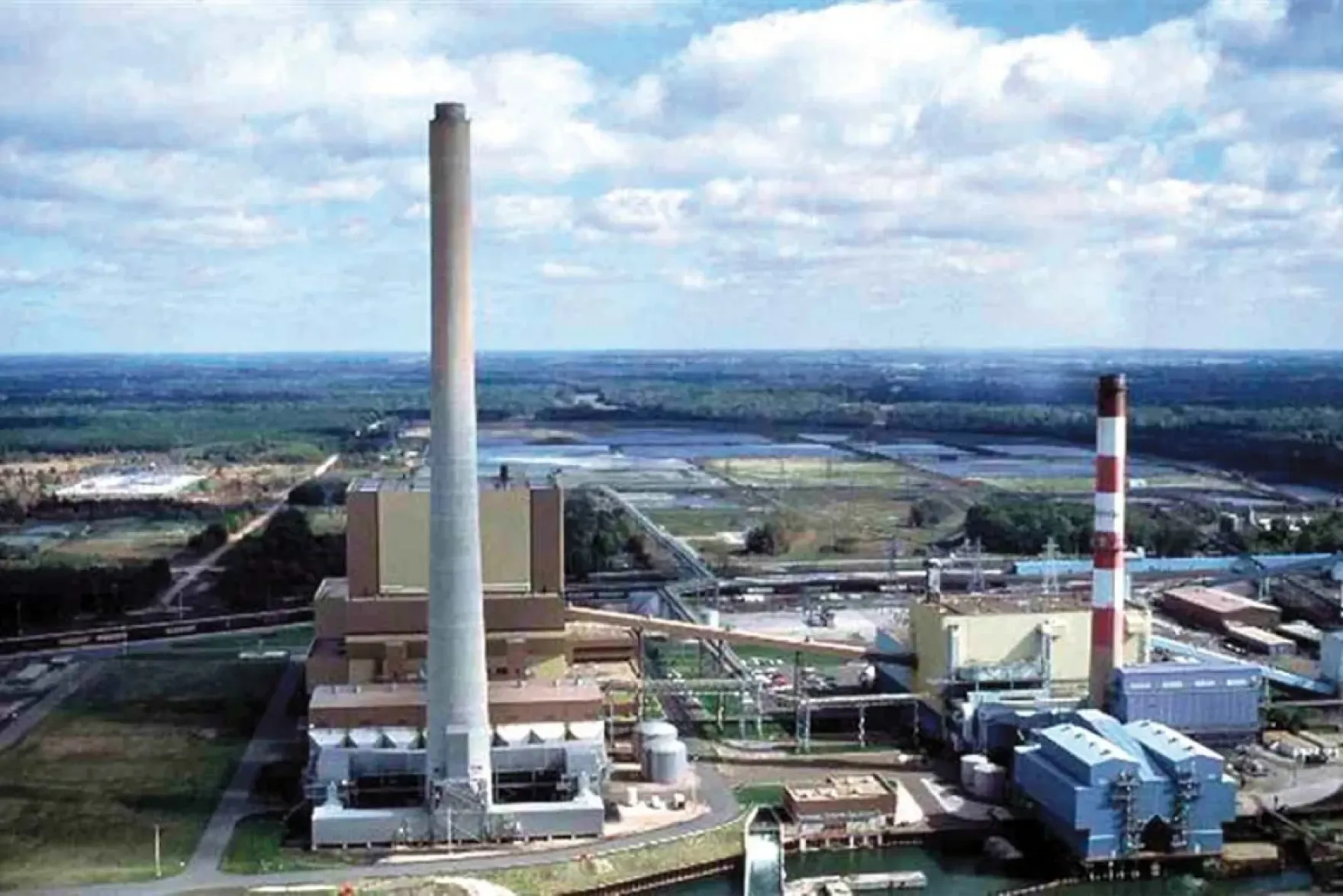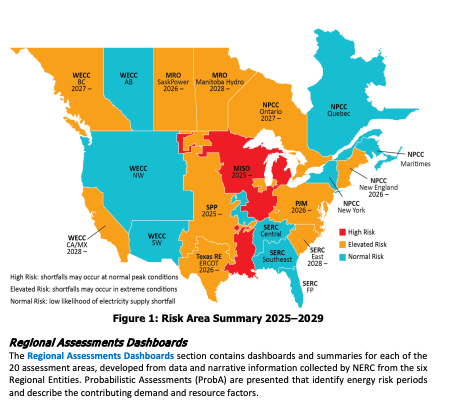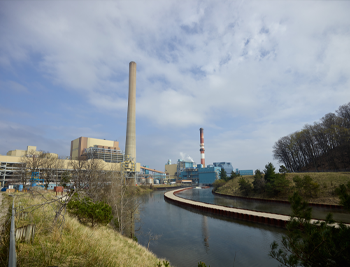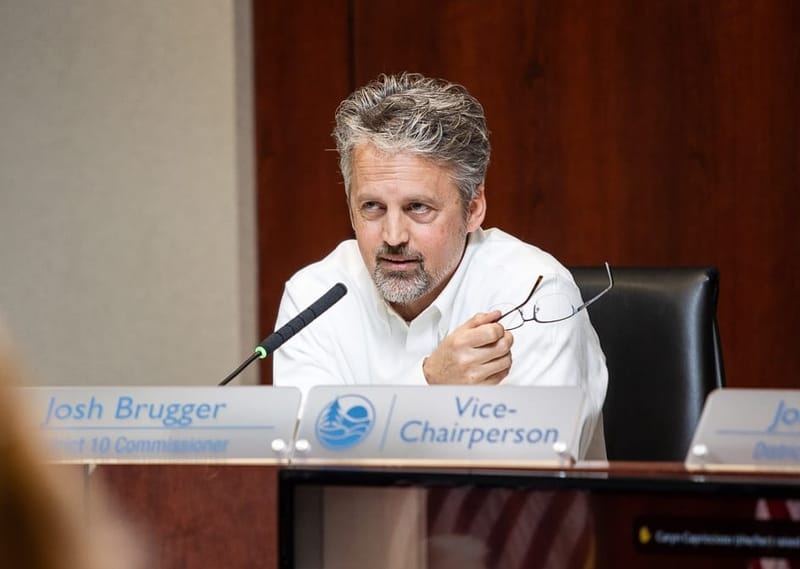Nessel challenges order to keep J.H. Campbell Plant open as energy experts predict price hikes
Michigan Attorney General Dana Nessel has challenged the U.S. Department of Energy's forcing the Consumers Energy-owned J.H. Campbell plant in Port Sheldon to remain open for 90 days, arguing that the move will force customers to absorb exorbitant costs.

Story summary
- On May 23, U.S. Secretary of Energy Chris Wright issued an emergency order demanding that the J.H. Campbell plant "remain available for operation" — just eight days before the plant was scheduled to shut down, a plan that has been in place since 2021.
- On Wednesday, Michigan Attorney General Dana Nessel filed a request for rehearing with the DOE, challenging what she described as an "arbitrary and illegal order."
- Energy experts say the cost to keep the plant open beyond its planned closure date could pass along millions in costs to taxpayers.
LANSING — Michigan Attorney General Dana Nessel has challenged the U.S. Department of Energy's forcing the Consumers Energy-owned J.H. Campbell plant in Port Sheldon to remain open for 90 days, arguing that the move will force customers to absorb exorbitant costs.
U.S. Secretary of Energy Chris Wright issued the emergency order demanding that the plant "remain available for operation" on Friday, May 23 — just eight days before the plant was scheduled to shut down, a plan that has been in place since 2021.
The U.S. Department of Energy said the move is intended “to minimize the risk of blackouts and address critical grid security issues in the Midwestern region of the United States ahead of the high electricity demand expected this summer.”
On Wednesday, Nessel filed a request for rehearing with the DOE, challenging what she described as an "arbitrary and illegal order seeking to stop the planned retirement of Consumers Energy’s J.H. Campbell coal-fired power plant in West Olive, Michigan, under the pretense of a fabricated energy emergency."
Read More: Campbell coal plant's closure delayed 90 days with Energy Secretary's emergency order
She said the order "will burden Michigan utility customers with unnecessary costs and needless additional pollution from the 60-year-old Ottawa County coal plant that was scheduled to close May 31."
A request for rehearing is a legal process where a party asks a court to reconsider a decision it has already made. It's typically used when a party believes the court made a mistake in its initial ruling, whether by overlooking a crucial fact, misinterpreting the law, or making some other error.
How we got here
The Campbell Plant is Consumers' last — and largest — coal-fired plant in the state.
The plant, operating since 1962, was originally scheduled to close partially in 2030 and wholly in 2040. But the utility announced in 2021 it was moving the plan up by 15 years for an operations end date of May 31, 2025.
Read More: Consumers Energy reaches agreement to close Campbell plant, end utility's coal use by 2025
The utility was seeking to end coal use altogether by 2025 as part of its goal to achieve carbon neutrality.
Since the announcement, Consumers has been actively preparing the plant for "full retirement," a spokesperson said last year.
"The complex will officially go into retirement with an aim to go cold and dark after 2025," said former Consumers spokesperson Kristen Van Kley. "In 2026 and on, the complex will be demolished with a plan to restore the site over time."
The plant, when operating at full capacity, can generate 1,450 megawatts of electricity. Michigan consumed about 113,740 gigawatt hours of electricity in 2019, according to a 2020 report from the U.S. Department of Energy.
At the time, Van Kley said new technologies would ensure Consumers would be able to continue supporting the statewide grid.
"Energy efficiency, demand response and emerging technologies such as grid modernization and battery storage will help us lower peak customer demand for electricity and deliver exactly what Michigan needs," she said. "Our plan is designed to respond to emerging needs, adapt to changing conditions and embrace emerging innovative technologies as we work to achieve net-zero carbon emissions."
The emergency order came after a yearlong effort from a local grassroots organization petitioned Ottawa County officials to intervene in some way to prevent the closure of the Campbell plant.
Read More: County poised to urge delay in closing Campbell as officials say plan likely won't change
Organizers of the "Save the Campbell" effort coalesced at the beginning of 2024 — mainly members of far-right fundamentalist groups such as Ottawa Impact, The Gideon 300 and the Ottawa County GOP — said a government-owned electric co-op was possible if voters approved a "home rule charter" at the ballot box.
The issue was never put up for a vote, so a change in government structure is not forthcoming; however, local officials asked Consumers for reassurance earlier this year that local energy supplies will be uninterrupted as the Campbell plant headed for closure at the end of May.
In February, the Ottawa County Board of Commissioners approved a resolution urging delay in the plant’s closure, however, officials stopped short April 22 of opting to bring litigation to prevent the closure altogether.
Commissioners pointed to two separate reports — from the Midcontinent Independent System Operator, or MISO, as well as the North American Electric Reliability Corporation, or NERC — that gave them concerns over the energy grid’s reliability once the Campbell is taken offline.
MISO published the results of its annual survey in June 2024, which indicated at the time that there was “a growing capacity deficit beginning in the 2025-26 planning year.”
“Next summer, MISO could see resource sufficiency ranging from a 2.7 GW capacity shortfall to a 1.1 GW surplus, underscoring the need to accelerate resource additions, monitor large load additions, and delay resource retirements to reliably manage the anticipated growth in electricity demand,” according to the survey.
NERC is a nonprofit international regulatory authority that more broadly looks at reliability standards as well as seasonal and long‐term outlooks for the entire U.S. grid. The group published a long-term reliability assessment in December 2024 that labeled MISO’s section of the grid as “high risk,” meaning the grid subsection that includes the state of Michigan “falls below established resource adequacy criteria in the next five years.”
“High-risk areas are likely to experience a shortfall in electricity supplies at the peak of an average summer or winter season. Extreme weather, producing wide-area heat waves or deep-freeze events, poses an even greater threat to reliability,” the report said.

Commissioner Jacob Bonnema questioned why Consumers opted to sunset the plant five years ahead than previously planned.
Dena Isabell, stakeholder engagement manager at Consumers, told commissioners in February that Consumers adopted in 2021 that helped the company identify about $600 million in savings for its customers over 20 years with the retirement of the plant.
“That includes renewables that get brought onto the grid, which are cheaper than what we have,” she said, “so that is a savings to our customers, which is part of the clean and affordable and reliable energy — so it's an economic decision.”
One component of the cost savings was coal.
Rich Houtteman, community affairs manager for Consumers, explained to commissioners in February that the cost of shipping coal is a huge financial consideration for the energy company.
“It's about $50 a ton to ship excess coal off-site,” he said. “We had 30,000 tons. That's a lot for our customers. So we're trying to burn up all the coal as we kind of bring in 130 train carloads a day.”
Last-minute intervention
On May 23, Secretary Wright directed MISO, in coordination with Consumers, to ensure that the 1,560 megawatt plant “[remain] available for operation, minimizing any potential capacity shortfall that could lead to unnecessary power outages.”
“Today’s emergency order ensures that Michiganders and the greater Midwest region do not lose critical power generation capability as summer begins and electricity demand regularly reach high levels,” Wright said in a prepared news release.
The Energy Department said the emergency order, which is issued by the Office of Cybersecurity, Energy Security, and Emergency Response, is authorized by Section 202(c) of the Federal Power Act and is in accordance with President Trump’s Executive Order: Declaring a National Energy Emergency to ensure that power generation availability in the region does not “dip below 2024 capacity levels.”
“This administration will not sit back and allow dangerous energy subtraction policies threaten the resiliency of our grid and raise electricity prices on American families. With President Trump’s leadership, the Energy Department is hard at work securing the American people access to affordable, reliable, and secure energy that powers their lives regardless of whether the wind is blowing, or the sun is shining."
The topic became a political talking point this year with Ottawa Impact commissioners. When the far-right group held a controlling majority on the board in 2023 and 2024, they largely avoided the subject, but since transitioning to a four-seat minority on the 11-member board in January, the topic has come up frequently.
OI Commissioner Allison Miedema strongly backed the county suing Consumers to prevent the Campbell closure; however, the measure lost in a 7-4 vote at the board's April 22 meeting.
OI Commissioner Sylvia Rhodea said at the board's May 27 meeting that Wright's order provided a "90-day reprieve" of the delayed closure of the Campbell plant.
"Man, we dodged a bullet with that one," she said.

What's the cost to keep Campbell open?
Nessel said Wright's order would lead to Michiganders "feeling a pinch in their pockets."
“The costs of maintaining production at the plant, long since prepared for closure, could be an enormous burden on the rate-paying customers of Consumers Energy," she said. "And that’s before taking into account the environmental and public health costs of continuing to fuel a coal-powered plant.”
In a June 3 statement, a Consumers spokesperson said the company is currently complying with the order.
"We are currently in compliance with the order, have arranged for new shipments of coal, some of which arrived last week, and will continuously operate the Campbell Plant," Trisha Bloembergen, West Michigan media relations specialist, said in a June 3 email. "We are still determining the overall cost, but want to ensure those costs are shared across MISO and not all on Consumers Energy customers."
Generating power at the Campbell plant is likely to be costly for ratepayers, experts from the Institute for Energy Economics and Financial Analysis wrote June 5.

Campbell Units 1 and 2, which are 63 and 58 years old, respectively, were already increasingly uncompetitive in the MISO market, meaning it cost more to generate electricity than what it could be sold for, said energy data analysts Seth Feaster and Dennis Wamsted.
According to data filed by Consumers at FERC, the operation and maintenance costs for the two units totaled $45.80 per megawatt-hour (MWh) in 2023 (the most recent data available). That puts both units in the red almost all the time in MISO: S&P data shows that the monthly around-the-clock price at the Michigan hub has been above $40/MWh just twice in the past two years, and never during the summer.
"In other words, the plant would lose money on virtually every MWh generated if past prices hold this summer, costs that could add up to many more millions of dollars if the units at Campbell are run for any substantial amount of time," Feaster and Wamsted said.
Beyond operational costs, there are fuel and staffing costs as well.
"Coal itself has gotten more expensive," said Frank Rambo, executive director at Horizon Climate Initiative, a nonprofit organization that works to use cost-saving energy market reforms to address the causes and impacts of climate change.
"That fleet has gotten more expensive to run. It's coal, which used to be synonymous with cheap power. It's now among the most expensive power ... and then the excess costs that are incurred because they're running more expensive resources.
Ultimately, it will be residents who foot the bill, Rambo said.
"They run those coal plants, and then they turn around, go to their commissions and recover those excess costs from their customers," he said.
Rambo said the price could be even higher than normal because Consumers would need to buy coal on the open market rather than enter into a new contract with a mine.
"We don't need to sign a new long-term coal supply contract because we're shutting the plant down," he said. "Now they may have to buy coal on the spot market."
The price of coal has hovered around $110 per ton on the U.S. commodities exchange. As of June 19, the price of coal was $103.85 per ton.
In 2024, Campbell burned more than 3.7 million tons of coal, Feaster and Wamsted said. That is an average of 12,700 tons of coal a day, which would amount to $1,318,895 per day using today's prices.
All of the Campbell plant's coal previously was delivered by rail from the Powder River Basin in northern Wyoming, according to the IEFF.
Two of the PRB’s biggest mines provided that coal: Arch Resources’ Black Thunder Mine, which delivered 2.25 million tons, and Peabody Energy’s North Antelope Rochelle Mine, which delivered 1.47 million tons.
Rambo also noted the plant staffing issue, explaining that Consumers likely already had phased out several employees who were then called back.
"We were laying these people off. Now we're going to have to hire them as contractors," likely at a higher pay rate because the work would be temporary, Rambo explained.
"There are all sorts of excess costs that would not be incurred, but for the fact that there's now this executive order," he said.
What happens next?
Feaster and Wamsted said Consumers has brought online 502MW of wind generation since 2020, bought the 1,055MW Covert combined cycle gas plant in 2023, and is in the process of adding 515MW of solar generation to its system by 2027.
They said this indicates that the DOE intervention wasn't necessary.
"These capacity-replacement moves were clearly enough for MISO. The system operator’s endorsement is critical, since it has the authority to require plants to continue operating if it believes grid stability or shortages could occur," the analysts wrote.
They pointed to MISO requiring Missouri-based Ameren to keep its 1,195MW Rush Island coal plant open in 2022 for reliability reasons. The decision was upheld by the Federal Energy Regulatory Commission and the plant remained open until 2024.
"MISO found no similar problems with Consumers’ plan to close the Campbell plant, saying as recently as May 8 that the region has sufficient resources to meet projected demand this summer," Feaster and Wamsted said. "Despite this, the Department of Energy said in its May 24 emergency order that it was directing MISO and Consumers to keep the plant open due to an expected 'insufficiency of dispatchable capacity' during the summer."
Rambo said he's concerned that this could indicate more federal intervention in the energy sector, which could drive up costs for all.
"This very well could be a bellwether of more things to come. And that's why I'm concerned about this as an example. Because if this does turn out to be the first of many, we should all be prepared for higher energy bills," he said.
Support Our Work
Ottawa News Network is a nonprofit news service dedicated to providing the residents of Ottawa County with trustworthy, community-driven news. ONN treats journalism as a public good — something that enriches lives and empowers Ottawa County’s 300,000-plus residents to stay engaged, make informed decisions, and strengthen local democracy. Please consider giving today.
"If this is going to be the MO of the Trump Administration as they go forward, it's troubling," he said, "because when I look at the J.H. Campbell situation, I see pretty extensive, robust, local, state and regional process, public participatory public officials — officials who are accountable to the public — analytical people, technical experts, weighing in, coming up with a plan, and then the federal government comes in at the 11th hour and second guesses all that, all of a sudden.
"That's really incredibly heavy-handed," he said.
Nessel said the DOE order was issued "without evidence, completely ignores state and federal regulators that approved the plant's retirement, and will potentially put enormous costs onto utility customers who receive no real benefit."
The Department of Energy has 30 days to respond to Nessel’s request, according to the Federal Power Act.
— Sarah Leach is the executive editor of the Ottawa News Network. Contact her at sleach@ottawanewsnetwork.org. Follow her on Twitter @ONNLeach.





